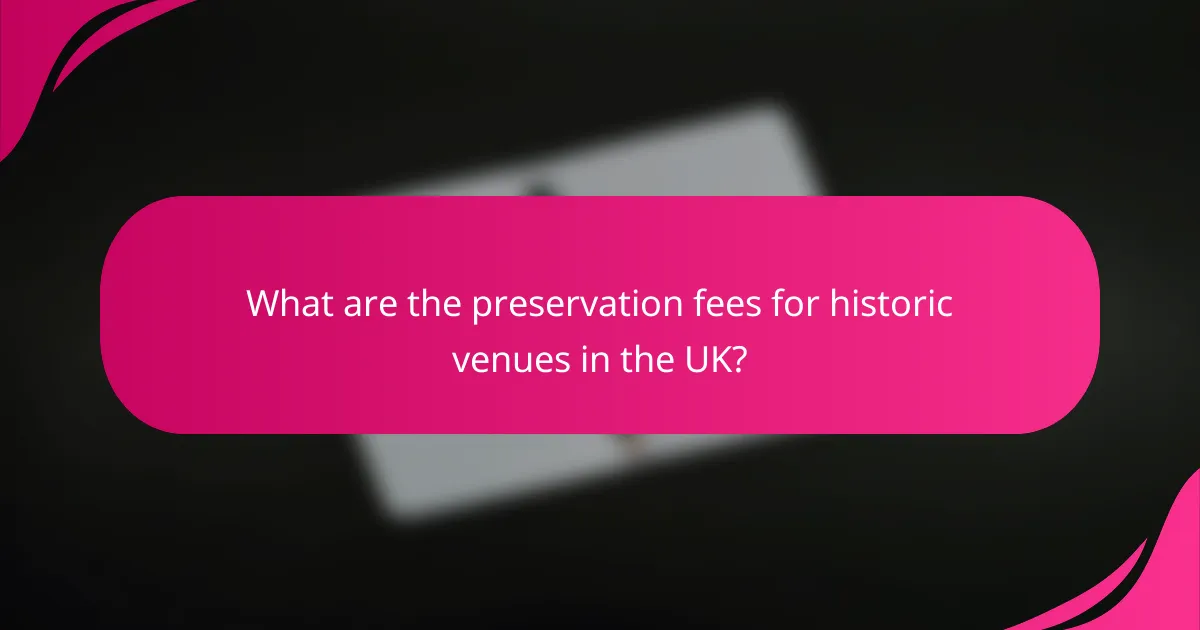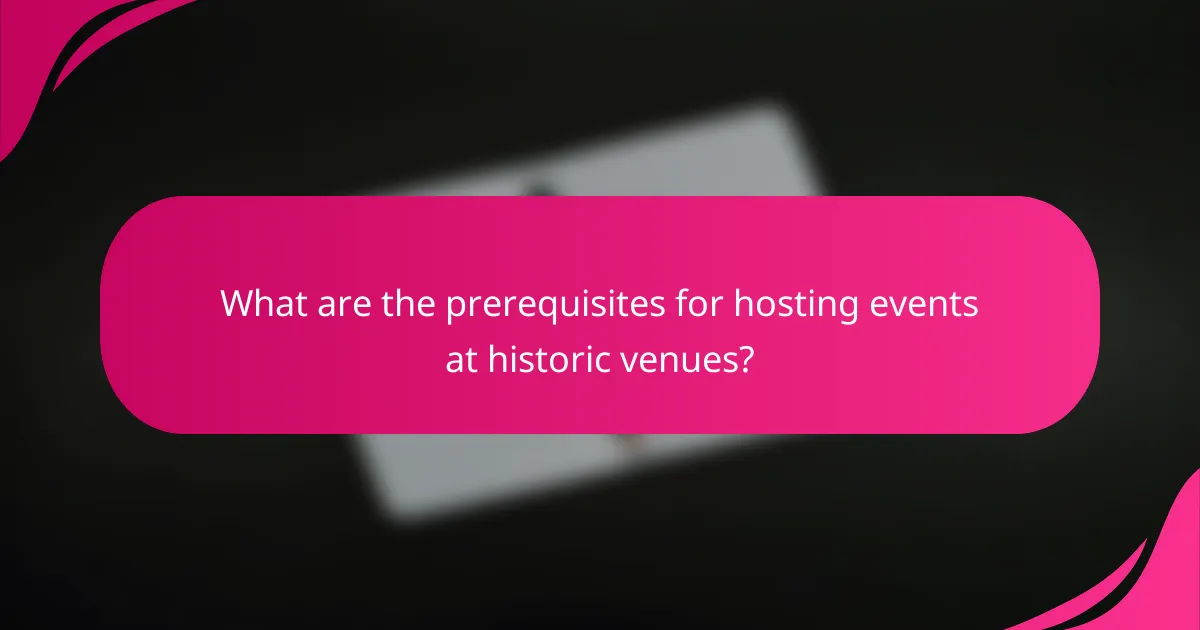Historic venues play a crucial role in preserving cultural heritage, and preservation fees are vital for their upkeep, varying based on significance and location. Visitors can easily book guided tours through official websites, ensuring an enriching experience. Additionally, event insurance is essential for safeguarding against potential liabilities associated with hosting events in these unique spaces.

What are the preservation fees for historic venues in the UK?
Preservation fees for historic venues in the UK vary widely based on the venue’s significance, location, and the specific preservation requirements. These fees are essential for maintaining the integrity and heritage of the site, ensuring it remains accessible for future generations.
Standard preservation fees
Standard preservation fees can range from a few hundred to several thousand pounds annually, depending on the venue’s size and historical importance. Smaller, less significant sites may incur lower fees, while major landmarks often face higher costs due to extensive maintenance needs.
These fees typically cover routine maintenance, conservation efforts, and compliance with heritage regulations. It’s advisable for venue operators to budget for these expenses as part of their operational costs.
Factors affecting preservation costs
Several factors influence preservation costs, including the age of the venue, its architectural features, and the materials used in its construction. Older buildings may require specialized restoration techniques, which can increase expenses significantly.
Location also plays a crucial role; venues in urban areas may face higher fees due to stricter regulations and higher labor costs. Additionally, the level of public access and the frequency of events held at the venue can impact overall preservation fees.
Examples of historic venues and their fees
For instance, a small historic church in a rural area might have preservation fees around £500 to £1,500 per year, while a prominent castle could see fees ranging from £5,000 to £20,000 annually. These examples illustrate the wide variance based on the venue’s significance and maintenance needs.
Another example is the Tower of London, which incurs substantial preservation costs due to its status as a UNESCO World Heritage Site. Such venues often rely on a combination of public funding and private donations to cover these expenses.

How can I book guided tours of historic venues?
To book guided tours of historic venues, you typically need to visit the venue’s official website or contact their visitor services directly. Many venues offer online booking options, allowing you to select dates, times, and the type of tour you prefer.
Popular historic venues offering tours
Several historic venues are renowned for their guided tours, including the Colosseum in Rome, the Tower of London, and Monticello in Virginia. Each of these sites provides unique insights into their history and architecture, making them popular choices for tourists and locals alike.
In addition to these, many smaller local historic sites also offer tours, often led by knowledgeable guides who can share lesser-known stories and facts about the area.
Booking process for guided tours
The booking process generally involves selecting your desired tour date and time on the venue’s website or through a phone call. Some venues may require advance reservations, especially during peak tourist seasons.
When booking, consider checking for any group discounts or special events that may enhance your experience. It’s advisable to confirm the cancellation policy in case your plans change.
Tour pricing and availability
Prices for guided tours of historic venues can vary widely, typically ranging from $10 to $50 per person, depending on the venue and the length of the tour. Some venues may offer free admission on certain days or discounted rates for students and seniors.
Availability can fluctuate based on the season and day of the week, so it’s wise to book early, especially for popular sites. Always check the venue’s website for the most current information on pricing and available tour times.

What types of event insurance are required for historic venues?
Event insurance for historic venues typically includes general liability coverage, property insurance, and sometimes specific endorsements for unique risks associated with older buildings. These policies protect against potential damages, injuries, and liabilities that may arise during events held in such locations.
Common event insurance policies
The most common event insurance policies include general liability insurance, which covers bodily injury and property damage, and event cancellation insurance, which protects against financial loss if an event must be canceled. Additionally, liquor liability insurance is often necessary if alcohol is served, as it covers claims related to alcohol-related incidents.
Property insurance is also essential for historic venues, as it protects the venue’s physical assets from damage due to fire, theft, or natural disasters. Depending on the venue’s specific needs, additional policies like equipment insurance may be beneficial.
Specific requirements for historic venues
Historic venues may have specific insurance requirements due to their unique structures and the potential for higher risks. For instance, some venues may require higher liability limits or specific endorsements that cover the historical significance of the property. It’s crucial to consult with the venue management to understand their exact insurance requirements.
Moreover, some historic venues may mandate that event organizers provide proof of insurance well in advance of the event date, ensuring adequate coverage is in place before any activities commence.
Recommended insurance providers in the UK
In the UK, several insurance providers specialize in event insurance for historic venues. Companies like Hiscox, Event Insurance Services, and Simply Business offer tailored policies that cater to the unique needs of such locations. It’s advisable to compare quotes and coverage options to find the best fit for your event.
When selecting an insurance provider, consider their experience with historic venues and the specific coverage options they offer. Reading customer reviews and seeking recommendations can also help in making an informed decision.

What are the prerequisites for hosting events at historic venues?
To host events at historic venues, you must secure the necessary permits, ensure compliance with preservation regulations, and consider the venue’s capacity and accessibility. Understanding these prerequisites helps streamline the planning process and ensures a successful event.
Necessary permits and approvals
Hosting an event at a historic venue typically requires various permits and approvals from local authorities. These may include special event permits, noise permits, and, in some cases, approvals from preservation boards to ensure compliance with historic preservation standards.
It is crucial to start this process early, as obtaining the necessary permissions can take weeks or even months. Check with local government offices or the venue management for specific requirements and timelines.
Venue capacity and accessibility considerations
Understanding the venue’s capacity is essential for planning your event. Historic venues often have restrictions on the number of attendees due to safety regulations and preservation concerns. Be sure to confirm the maximum capacity to avoid overcrowding and potential fines.
Accessibility is another critical factor. Ensure that the venue meets local accessibility standards, including wheelchair access and facilities for individuals with disabilities. This consideration not only complies with regulations but also enhances the experience for all guests.

How do preservation fees impact event planning at historic venues?
Preservation fees are charges imposed by historic venues to maintain their cultural and architectural integrity. These fees can significantly influence the overall budget and planning process for events held at such locations.
Budgeting for preservation fees
When planning an event at a historic venue, it’s essential to incorporate preservation fees into your budget. These fees can vary widely, often ranging from a few hundred to several thousand dollars, depending on the venue’s significance and the extent of preservation required.
To effectively budget for these fees, consider creating a detailed cost breakdown. Include not only the preservation fees but also potential additional costs such as insurance and permits. This approach helps ensure that you have a comprehensive understanding of the total financial commitment involved.
Negotiating fees with venue management
Negotiating preservation fees with venue management can be a crucial step in event planning. Start by researching comparable venues and their fee structures to establish a baseline for your discussions. This information can empower you to negotiate more effectively.
During negotiations, be clear about your event’s scope and the benefits it brings to the venue. Highlighting the positive exposure and potential for future bookings can sometimes lead to reduced fees. Always be prepared to discuss your budget constraints and explore flexible payment options or package deals that may include preservation fees.

What are the benefits of guided tours for event attendees?
Guided tours offer event attendees a structured way to explore historic venues, enhancing their overall experience and understanding of the site. These tours provide insights that self-guided visits may lack, making the event more memorable and informative.
Enhancing guest experience
Guided tours can significantly elevate the guest experience by providing a curated journey through the venue. Attendees benefit from the expertise of knowledgeable guides who share engaging stories and historical context, creating a richer atmosphere. This structured approach helps maintain a cohesive flow, ensuring that guests do not miss key highlights of the venue.
Moreover, guided tours often include interactive elements, such as Q&A sessions or multimedia presentations, which can keep guests engaged and foster a sense of community among attendees. This social aspect can enhance networking opportunities during events.
Educational value of guided tours
The educational value of guided tours is substantial, as they offer attendees a deeper understanding of the venue’s history and significance. Guides typically share fascinating anecdotes, historical facts, and cultural insights that enrich the visitor’s experience. This knowledge can be particularly beneficial for attendees interested in history, architecture, or local culture.
Additionally, guided tours can cater to various interests, allowing for specialized themes such as art history or architectural styles. This customization can enhance the relevance of the tour for different groups, making it a valuable addition to any event held at a historic venue.



